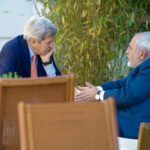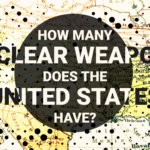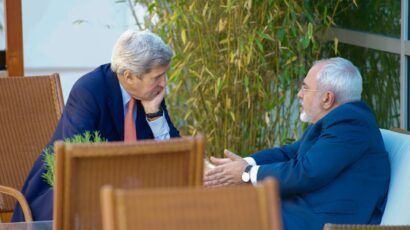Learning from Labour: What nuclear disarmament can borrow from Jeremy Corbyn
By John Carl Baker | July 6, 2017
Jeremy Corbyn’s Labour Party pulled off a stunning upset in the recent British elections, destroying the Tories’ majority and endangering Theresa May’s future as prime minister. Labour accomplished this despite long odds and the near-universal assumption among the commentariat and much of the political class that Corbyn’s leadership would inevitably lead the party to a crushing defeat. Corbyn, an unapologetic left-winger whose leadership has been repeatedly—and unsuccessfully—challenged by the Blairite Labour establishment, instead increased the party’s share of the vote more than any leader since Clement Attlee in 1945. Once derided by his own party as a socialist relic of a previous age, Corbyn may now be well on his way to becoming the next prime minister of the United Kingdom.
Labour’s success offers some critical insights for activists working toward nuclear disarmament. Though Corbyn’s support for disarmament is well known—and puts him in a rather awkward position, given the pro-Trident stance of the Labour Party itself—in my view it is the form and substance of Corbyn’s campaign, rather than his personal politics, from which the most important lessons can be drawn. Two items in particular top this list of takeaways from Labour’s surprise showing at the polls, and both are major political heresies. The first is that polarization, contrary to conventional wisdom, is actually a very sound strategy for political success. The second, closely related lesson is that in this moment of political and economic crisis, a politics of maximalism and, yes, utopianism once again has mass appeal.
Go to the poles. Writing recently about Corbyn’s successful campaign formula, the New Republic’s Sarah Jones noted that for the first time in decades, the Labour Party sounded as if it represented, well, labor. “They positioned themselves unapologetically in accordance with their name,” Jones wrote. “They are the party of labor, and not of capital.” For American observers, many of whom have only a cursory knowledge of UK politics, this may seem like a banal observation. But it is not. Under Tony Blair’s leadership, the Labour Party radically transitioned from a social democratic party with strong roots in the labor movement to a neoliberalized party of business-friendly market reforms.
So for the latest Labour Party manifesto to propose policies such as public ownership of water and energy utilities; expanded social welfare programs; and vastly strengthened workers’ rights truly is a departure from recent history and a complete rebuke of the once-dominant idea that free-market policies are beneficial across the board. Corbyn’s Labour Party now neither claims to represent the rich nor is particularly concerned with garnering their approval. The current Labour Party, as its slogan politely implies, is a coalition of the many against the few.
Favoring labor over capital rather than attempting to placate both sides is a quite literally polarizing move—and in the United States and the United Kingdom, pursuing a middle path has long been presumed to be the only reliable way to win elections. This idea was a chief rationale behind New Labour, which held that while socialism was a nice idea, the UK electorate simply wasn’t ready for it: Thus did staid moderation become synonymous with “electability.” Corbyn’s runaway success has completely shattered this justification for running to the center.
Labour’s situation has parallels in the disarmament and arms control community. In the Obama years, it was presumed that since the presidency was safely in the hands of a nuclear weapons skeptic, a moderate, inside-the-beltway strategy was likely the best path for influencing nuclear policy. This centrist approach helped garner some legitimate successes, in the Iran deal and New START, but is clearly insufficient for an era in which Donald Trump, as president-elect, used the phrase “let it be an arms race” to a television journalist. The nuclear risks posed by Trump are legitimate and to some extent exceptional, and they need to be met with a politics of sharp delineation.
Are there prospects for such a politics when it comes to nuclear disarmament? Absolutely. The nuclear weapons ban treaty is without a doubt the most polarizing issue in the arms control community today. Now seemingly on a path to open for signature in September, the ban treaty is already functioning like a line in the sand. It forces the nuclear-armed states (and those under their umbrellas) to answer some very pointed and uncomfortable questions. Do you support global nuclear arms reductions or not? Are you working to free the world from nuclear weapons or are you actively hindering progress toward disarmament? When the United States, Russia, and other nuclear-armed states refuse to participate in the treaty process, they only confirm what was already presumed by everyone else: that they are not truly committed to disarmament; that they hold the international community in complete disregard; and that they are willing to risk the lives of billions worldwide in the name of deterrence and national defense.
This dynamic puts the nuclear-armed states in a very awkward position—especially the United States and Russia, which love to talk about nonproliferation efforts in countries such as Iran but not about their own possession of more than 90 percent of the world’s nuclear weapons. The ban treaty also exposes fertile tensions between the leadership of NATO countries and these nations’ citizenry, many of whom favor more concrete action toward disarmament. If NATO allies such as the Netherlands or Norway end up signing the ban treaty, for instance, the door could swing open to further defections.
Rhetorically, too, the ban treaty drives a wedge in the international conversation about nuclear weapons. It refuses to let the nuclear-armed states dominate the discourse, and instead allows the nuclear-free states—the overwhelming majority of countries on Earth—to go on the offensive. As University of Bradford professor Paul Rogers put it in January, the ban treaty positions the nine nuclear-armed countries as rogue states flying in the face of international norms. Rogers’s formulation is a provocative inversion of the way “rogue states” is normally used (typically by the nuclear-armed countries) and a compelling example of the rhetorical possibilities opened up by the ban treaty’s mere existence. The ban’s polarizing character challenges the presuppositions of international relations and the pieties of nonproliferation discourse. Disarmament advocates worldwide can only benefit from this productive reshuffling of the ideological and geopolitical environment.
Abuses (and uses) of utopia. Advocates for disarmament and arms control often use the term “a world without nuclear weapons” to describe their vision of utopia, but they aren’t the only ones to use it. Since the nuclear freeze movement pushed Ronald Reagan to do a U-turn on the arms race, it’s been de rigueur for US presidents to at least gesture toward this supposedly shared aim.
Scandalously, the Trump administration is now revisiting whether the US government should even give nominal rhetorical support to eventual disarmament. But while this development is certainly worrisome, compared to the actions of recent administrations it is more a difference of degree than kind. Barack Obama’s particularly egregious dichotomy—giving the go-ahead to the next generation of nuclear weapons as part of a deal to pass New START—demonstrates the hollowness with which the utopia of disarmament is repeatedly invoked.
Trump, in his boorish incompetence, has actually done the world a favor in declaring openly what is obvious but never to be spoken aloud: The nuclear-armed states have no real intention of abiding by Article VI of the Nuclear Non-Proliferation Treaty, which requires them to make a good-faith effort toward disarmament. In the mouths of politicians, “a world without nuclear weapons” has become a telos without a process, a utopia conveniently walled off from the very movement that might bring it about.
The cynical appropriation of this utopia by the nuclear-armed powers is frustrating, but as the Labour campaign shows, now is not the time to flee from utopianism, but to reclaim it. Corbyn ran a campaign of unabashed maximalism, pushing for policies that were significant departures from the status quo: bringing the railway, postal system, and water utilities into public ownership, expanding free child care, raising the minimum wage, increasing taxes on top earners, charging companies for high executive salaries—the list goes on and on. On security and foreign policy issues he was arguably even more radical, stating outright that military intervention abroad increases the risk of terrorist attacks at home. Corbyn put forth a fully articulated alternative to the “strong, stable leadership” of May and the Tories, who offered little to the electorate but more of the same. In contrast, the Labour Party manifesto was an inspiring vision of a wholly different society with equality and democracy as its core principles.
Labour’s success shows that this is not a time for cautious incrementalism. The momentum is with parties and social movements that take an unabashedly utopian approach to politics and policy. Serendipitously, the nuclear weapons ban treaty is well suited for this moment, because it refuses to see “a world without nuclear weapons” as part of a hazy and almost unimaginable future. Instead, it recasts this blurred idealistic vision as a goal attainable in our time and offers a concrete trajectory by which a world without nuclear weapons can actually be constructed. In short, the ban treaty restores the link between the utopia of a nuclear weapons–free world and the forces actively working to establish it. You might even say the ban treaty redistributes this vision back to the many, and not the few.
The US arms control community tends to be more comfortable with incremental approaches to reducing nuclear arsenals and mitigating nuclear risk. And I would be the last person to dismiss badly needed interventions such as the Lieu-Markey legislation, which “would prohibit the president [of the United States] from launching a nuclear first strike without a declaration of war by Congress.” Such efforts would go a long way toward partially democratizing the thermonuclear monarchy in the United States. But it is helpful, I think, that the ban treaty functions as a sort of compass to reorient disarmament advocates back toward the overarching goal they supposedly profess. The weeds of nuclear policy wonkery are sometimes unavoidable, but the ban treaty serves as a reminder that, ultimately, they’re still weeds. One doesn’t want to get lost on the way to utopia.
A different world. The international situation is remarkably tenuous right now. From Brexit to the ban treaty, the institutions of a previous historical moment are giving way to new and still undefined arrangements. For many august observers, who tend to value stability as an objective good, this uncertainty is a wholly negative development. But while the current shake-up of the international order clearly presents reasons for concern, it also presents opportunities—especially for political formations that have long been shut out of the mainstream. The Labour Party under Jeremy Corbyn is one of the first groups to take advantage of this opening—and now an unrepentant socialist is a hair’s breadth away from moving into 10 Downing Street.
For nuclear disarmament advocates, the benefits of this situation are clear. The old rules have been thrown out and the new ones have yet to be written. Corbyn’s Labour Party serves as one example of how to take advantage of this wide-open political environment. But Labour’s success, which came after two years of tumult in the party—including deep divides between elected members of parliament and the rank and file—also shows how difficult progress can be. Bidding adieu to the worn-in strategies and assumptions of an earlier period is never easy, but doing so is absolutely essential for adapting to the present conjuncture. Luckily for disarmament supporters, this particular moment appears surprisingly friendly to radical ideas and transformative change.
Together, we make the world safer.
The Bulletin elevates expert voices above the noise. But as an independent nonprofit organization, our operations depend on the support of readers like you. Help us continue to deliver quality journalism that holds leaders accountable. Your support of our work at any level is important. In return, we promise our coverage will be understandable, influential, vigilant, solution-oriented, and fair-minded. Together we can make a difference.
Topics: Nuclear Weapons, Opinion















